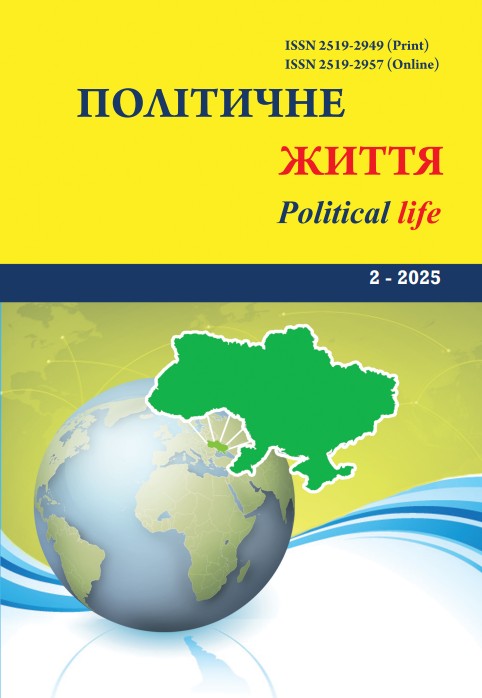Evolution of Models of Political Participation: From Classical Concepts to the Digital Era of E-Democracy
DOI:
https://doi.org/10.31558/2519-2949.2025.2.4Keywords:
political participation, e-democracy, models of democracy, digital technologies, political activity, civil societyAbstract
The article provides a systematic analysis of the evolution of the concept of political participation as a key indicator of the democratic development of society. A comprehensive theoretical analysis of the transformation of this phenomenon from classical philosophical concepts to modern models formed under the influence of digital technologies and changes in democratic institutions is conducted. The historical stages of the formation of the concept of "political participation" are considered, starting with the ideas of active citizenship in ancient political thought, where collective decision-making in the polis was a direct form of participation, ending with the concepts of liberal, deliberative and participatory democracy of the 20th–21st centuries. Throughout history, the concept of "political participation" has undergone significant changes, transforming from a description of a direct form of participation in community affairs into representative and institutionalized mechanisms of modern influence on politics and other spheres of life. Particular attention is paid to its transformation under the influence of the dominance of various models of democracy: elitist, pluralistic, participatory and deliberative. The author also systematized the main scientific approaches to the analysis of political participation, highlighting such models as: civic voluntarism, which emphasizes the voluntary participation of citizens; rational choice theory, which considers participation as the result of rational decisions of individuals aimed at maximizing their own benefit; socio-psychological explanations, which focus on the influence of social norms, identity, and psychological factors. Mobilization concepts: study the processes of organized mobilization of citizens to participate; protest participation, which analyzes forms of disagreement and public expression of dissatisfaction; pre-political participation, which encompasses forms of activity that are not directly political, but can have political consequences. The latest approaches are highlighted, which emphasize non-institutional, horizontal, and individualized forms of activity. Particular attention is paid to the impact of digitalization, which causes the spread of horizontal formats of participation, the activation of online activism, petitions, and interaction through social networks and digital platforms. The author emphasizes the growing role of digital participation formats that go beyond traditional voting and party activity. The thesis is substantiated about the transition of political participation to a hybrid model in the 21st century. This model synthesizes classical institutional mechanisms with new digital tools of horizontal mobilization and influence on political decisions. It is proven that political participation in the 21st century is a multidimensional phenomenon that includes both traditional offline formats and new digital platforms that operate in the mode of horizontal mobilization. The impact of digital technologies on the growth of the role of individualized and non-institutional forms of participation is demonstrated, in particular within the framework of e-democracy, crowdsourcing platforms, social networks, online petitions and algorithmic political behavior. These factors contribute to the expansion, but at the same time complicate civic engagement. The peculiarities of political participation in Ukraine in the context of post-Soviet transformation, digitalization of public administration, regional political culture and distrust of institutions are outlined. The Ukrainian context of the development of political participation is analyzed, where post-Soviet distrust of institutions is combined with the activation of digital participation and the influence of the volunteer movement, as well as the practice of e-petitions. An interdisciplinary methodology is applied: a systemic approach, structural-functional analysis, comparative and typological methods. It is argued that effective democratization requires not only digital tools of participation, but also a rethinking of its structural, motivational, value and communicative factors. The article formulates theoretical foundations for the further development of an integrative model of political participation in the conditions of hybrid democracy and digital transformation.
References
Carpentier, Nico, Peter Dahlgren, and Francesca Pasquali. “The Democratic (Media) Revolution: A Parallel History of Political and Media Participation.” In Audience Transformations: Shifting Audience Positions in Late Modernity, edited by Nico Carpentier, Kim Schrøder, and Lawrie Hallett, 2014, 123–141.
Verba S., Nie N. Participation in America. URL: https://adambrown.info/p/notes/verba_and_nie_participation_in_america.
Pateman, C. Participation and democratic theory. Cambridge, UK: University Press. 1970.
Іовчук О. Сучасні підходи до політичної участі. Політологічний вісник. 2021. № 24.
Ekman, J., & Amnå, E. Political participation and civic engagement: Towards a new typology. Human affairs, 2012, 22, 283-300.
Wurst A-K, Pohl K and Haßler J. Mobilization in the context of campaign functions and citizen participation. Media and Communication. 2023. 11(3): 129–140..
Norris, P. Democratic Phoenix: Reinventing political activism. Cambridge University Press. 2002.
Hagen M. A Typology of Electronic Democracy. URL: http://www.martin-hagen.net/publikationen/elektronische-demokratie/typology-of-electronic-democracy/.
Teorell, J., & Torcal, M. Political participation: Mapping the terrain. In Citizenship and involvement in European democracies 2007. (pp. 358-381). Routledge..
Theocharis, Y., & Van Deth, J. W. The continuous expansion of citizen participation: A new taxonomy. European political science review, 2018. 10(1), 139-163..
Ekman, J., & Amnå, E. Political participation and civic engagement: Towards a new typology. Human affairs, 2012. 22, 283-300.
Morium B. People’s Political Participation: A Theoretical Exposition and Reality in Case of Bangladesh. Journal of Social and Political Sciences. 2024. Vol. 7, No. 3. С. 75–89.
Whiteley P. F., Seyd P. High-intensity participation: the dynamics of party activism in Britain. URL: https://www.press.umich.edu/pdf/0472106201-ch2.pdf .
Rosenstone S. J., Hansen J. M. Mobilization, participation, and democracy in America. New York: MacMillan, 2003. 333 p.
Ротар Н. Ю. Участь громадян України у циклічних політичних процесах трансформаційного періоду : дис. д. політ. н.: 23.00.02 / Чернівец. нац. ун. м. Ю. Федьковича. Чернівці, 2007. 517 с.
Бортніков В. І. Політична участь громадян України в умовах демократичного транзиту : дис... д-ра політ. наук : 23.00.02. Волинський національний університет ім. Лесі Українки. Луцьк 2008. 451 с.
Сальнікова С., Мацюк О. Політична участь: концептуальні схеми, методики вимірювання. Соціологічні студії. 2012. № 1. С. 87-92..
Барановський, Ф. Регіональний вимір політичної культури. Наукові записки Інституту політичних і етнонаціональних досліджень ім. ІФ Кураса НАН України, 2009. (44), 213-220.

